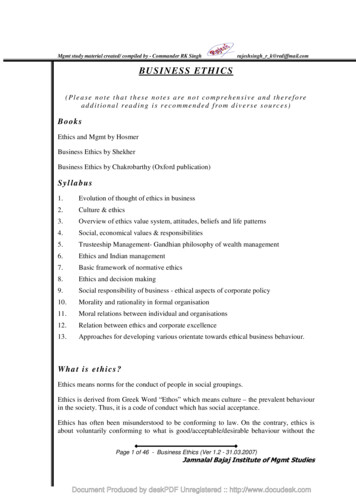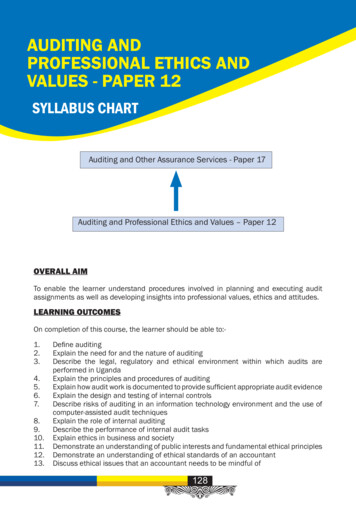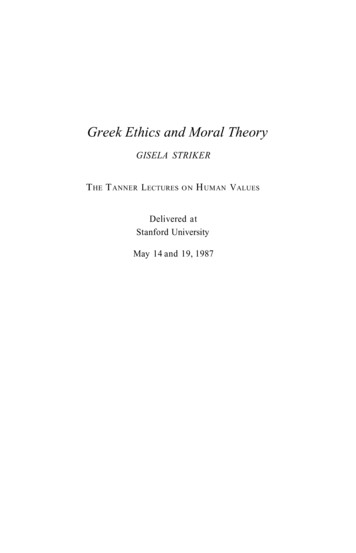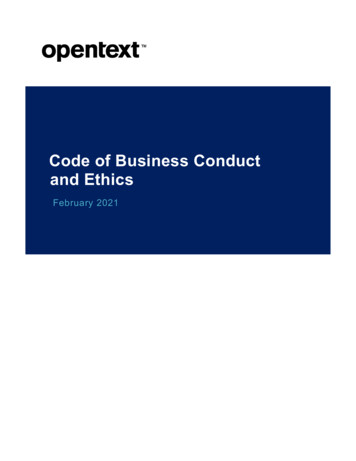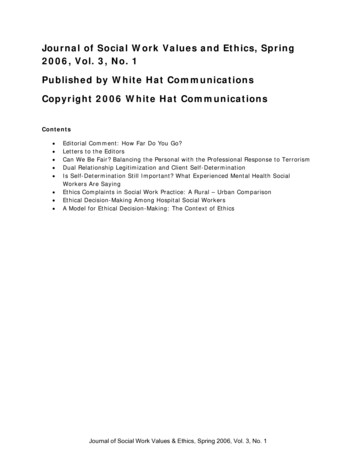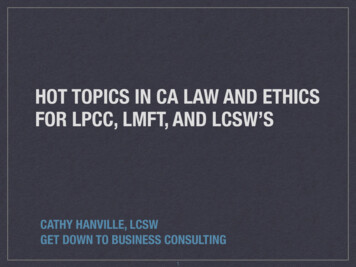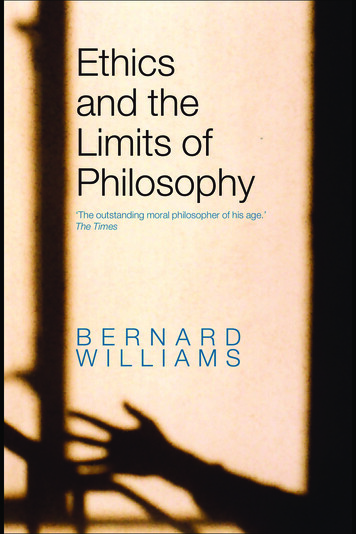
Transcription
ETHICS AND THELIMITS OF PHILOSOPHY‘Bernard Williams’s book is better read not as an introduction toethics, but as an attempt to take stock of the present state of thesubject. As such, it is a splendid piece of work.’ Richard Norman,Times Higher Education Supplement‘This is a superior book, glittering with intelligence and style.’Thomas Nagel, Journal of Philosophy‘Williams’s discussions are much to be valued: his explicitness andargumentative ingenuity focus the issues more sharply, and atgreater depth, than any comparable work I know . . . One of themost interesting contributions of recent years, not only to ethicsbut to philosophy’. John McDowell, Mind‘Who has not asked – if only when depressed – “How should Ilive, and how can I find out?” To read this book is to be takenthrough one of the most sophisticated discussions available ofsuch questions by an engaging, sceptical, often wryly witty andextraordinary subtle professional.’ Ronald de Sousa, New YorkTimes Book Review‘Remarkably lively and enjoyable . . . It is a very rich book, containing excellent descriptions of a variety of moral theories, andinnumerable and often witty observations on topics encounteredon the way.’ Philippa Foot, Times Literary SupplementBy the time of his death in 2003, Bernard Williams was acknowledged to be one of the greatest philosophers of his generation.His work was marked by an unusual combination of rigour,imagination and depth, and by its humanity. His books includeMorality, Utilitarianism: For and Against, Descartes: The Project ofPure Enquiry, Shame and Necessity and Truth and Truthfulness.
Bernard WilliamsEthics andthe Limitsof PhilosophyWith a commentary on the textby A. W. Moore
First published by Fontana Press 1985This edition first published 2006by Routledge2 Park Square, Milton Park, Abingdon, OX14 4RNThis edition published in the Taylor & Francis e-Library, 2006.“To purchase your own copy of this or any of Taylor & Francis or Routledge’scollection of thousands of eBooks please go to www.eBookstore.tandf.co.uk.”Routledge is an imprint of the Taylor & Francis Group, an informa business Bernard Williams 1985, 1993Bernard Williams asserts the moral right to be identified as the author of this work‘Commentary on the Text’ A. W. Moore 2006, reprinted with permission fromAcumen PressAll rights reserved. No part of this book may be reprinted or reproduced or utilisedin any form or by any electronic, mechanical, or other means, now known orhereafter invented, including photocopying and recording, or in any informationstorage or retrieval system, without permission in writing from the publishers.British Library Cataloguing in Publication DataA catalogue record for this book is available from the British Library.ISBN10: 0-415-39984-x (hbk)ISBN10: 0-415-39985-8 (pbk)ISBN10: 0-203-96984-7 (ebk)ISBN13: 978-0-415-39984-5 (hbk)ISBN13: 978-0-415-39985-2 (pbk)ISBN13: 978-0-203-96984-7 (ebk)
For Jacob
PrefaceEhis book is principally about how things are in moral philosophy, not about how they might be, and since I do not thinkthey are as they should be, some of it consists of criticism of presentphilosophy. Some of it, further, raises the question of how far anyphilosophy could help us to recreate ethical life. As I shall try toshow, it can at least help us to understand it. In the course of sayingwhat the present state of affairs is, and complaining about it, I hopeto introduce a picture of ethical thought and a set of ideas that applyto it, which could also help us to think about how it might be.There are two points I should like to make briefly at the beginning. It may seem surprising that a study of contemporary moralphilosophy spends some time, particularly in the first three chapters, considering some ideas to be found in ancient Greek thought.This is not just the piety of philosophy toward its history. There is aspecial reason for it, which I hope will emerge in the course of thebook (I try to make it explicit in the Postscript). The idea is certainlynot that the demands of the modern world on ethical thought areno different from those of the ancient world. On the contrary, myconclusion is that the demands of the modern world on ethicalthought are unprecedented, and the ideas of rationality embodiedin most contemporary moral philosophy cannot meet them; butsome extension of ancient thought, greatly modified, might be ableto do so.The second point is a matter of style. The philosophy of thisT
viiiPrefacebook can no doubt be called, on some broad specification, “analytical,” and so is much of the recent philosophy it discusses. I takethis to be, indeed, a matter of style, and the limitation it introducescomes only from the fact that style must to some extent determinesubject matter. There is no distinctive subject matter of analyticalmoral philosophy, as compared with other kinds of moral philosophy. What distinguishes analytical philosophy from other contemporary philosophy (though not from much philosophy of othertimes) is a certain way of going on, which involves argument, distinctions, and, so far as it remembers to try to achieve it and succeeds, moderately plain speech. As an alternative to plain speech, itdistinguishes sharply between obscurity and technicality. It alwaysrejects the first, but the second it sometimes finds a necessity. Thisfeature peculiarly enrages some of its enemies. Wanting philosophyto be at once profound and accessible, they resent technicality butare comforted by obscurity.The aim of analytical philosophy, as it always says, is to be clear.I am not altogether sure of its title to that claim, still less of itsunique title to it. I do not want to discuss that here, partly becauseif one discusses such issues, one discusses nothing else, and alsobecause I do not care very much whether this work is regarded asanalytical philosophy — I merely recognize that it will be. However, I do care that it should be what I call “clear.” I suggest in thecourse of the book that certain interpretations of reason and clearunderstanding as discursive rationality have damaged ethicalthought itself and distorted our conceptions of it. But if claims ofthat sort are to carry conviction in coming from a philosophicalwriter, they are themselves best set out with some degree of discursive rationality and argumentative order, and that is what I havetried to give them. I have no doubt often failed, and there are manythings that are obscure though I have tried to make them clear. Ican acknowledge this with more assurance than I can that somethings are obscure because I have tried to make them clear in thisway, but that is no doubt true as well.I am indebted to many people for their help, but none is to blame forthe results. I was able to try our various early versions of my criti-
Prefaceixcisms of ethical theory in certain lectures that I was honored to beasked to give: the Tanner Lectures at Brasenose College, Oxford,the Thalheimer Lectures at Johns Hopkins University, and theGregynog Lectures at the University of Wales at Aberystwyth. Onall these occasions I was grateful to those present for comments andcriticisms. I had the opportunity to give a seminar on moral philosophy at Princeton University in 1978, as Senior Visiting Fellow inthe Humanities, and benefited from discussion with many people,in particular with Thomas Nagel and Tim Scanlon. Ronald Dworkin has for a long time been a friendly, searching, and always unsatisfied critic. Drafts of this book, in whole or part, have been read byGeoffrey Hawthorn, Derek Parfit, Jonathan Lear, and AmartyaSen, to all of whom I am indebted for their comments. I am gratefulto Mark Sacks for research assistance and to Peter Burbidge for helpwith the index.The quotation from Wallace Stevens on page x is from TheCollected Poems, copyright 1954 by Wallace Stevens, reprinted bypermission of the publishers, Alfred A. Knopf, Inc. (New York),and Faber and Faber (London).Cambridge, England
EContents1 Socrates’ Question 12 The Archimedean Point223 Foundations: Well-Being304 Foundations: Practical Reason5 Styles of Ethical Theory54716 Theory and Prejudice 937 The Linguistic Turn1208 Knowledge, Science, Convergence 1329 Relativism and Reflection15610 Morality, the Peculiar InstitutionPostscript197Commentary on the Text 203A. W. MooreNotes 227Index 249174
How cold the vacancyWhen the phantoms are gone and the shaken realistFirst sees reality. The mortal noHas its emptiness and tragic expirations.The tragedy, however, may have begun,Again, in the imagination’s new beginning,In the yes of the realist spoken because he mustSay yes, spoken because under every noLay a passion for yes that had never been broken.wallace stevens, “Esthétique du Mal”Quand on n’a pas de caractère, il faut bien sedonner une méthode.albert camus, La Chute
CHAPTER 1Socrates’ QuestionEt is not a trivial question, Socrates said: what we are talkingabout is how one should live. Or so Plato reports him, in one ofthe first books written about this subject.1 Plato thought that philosophy could answer the question. Like Socrates, he hoped thatone could direct one’s life, if necessary redirect it, through anunderstanding that was distinctively philosophical—that is to say,general and abstract, rationally reflective, and concerned with whatcan be known through different kinds of inquiry.The aims of moral philosophy, and any hopes it may have ofbeing worth serious attention, are bound up with the fate of Socrates’ question, even if it is not true that philosophy, itself, canreasonably hope to answer it. With regard to that hope, there aretwo things to be mentioned here at the outset. One is particularly tobe remembered by the writer—how large a claim he is making if hesays that a particular kind of abstract, argumentative writingshould be worth serious attention when these large questions are atissue. There are other books that bear on the question—almost allbooks, come to that, which are any good and which are concernedwith human life at all. That is a point for the philosophical writereven if he does not think his relation to Socrates’ question lies intrying to answer it.The other initial point is one for the reader. It would be aserious thing if philosophy could answer the question. How couldit be that a subject, something studied in universities (but not onlyI
2Ethics and the Limits of Philosophythere), something for which there is a large technical literature,could deliver what one might recognize as an answer to the basicquestions of life? It is hard to see how this could be so, unless, asSocrates believed, the answer were one that the reader would recognize as one he might have given himself. But how could this be?And how would this be related to the existence of the subject? ForSocrates, there was no such subject; he just talked with his friends ina plain way, and the writers he referred to (at least with any respect)were the poets. But within one generation Plato had linked thestudy of moral philosophy to difficult mathematical disciplines,and after two generations there were treatises on the subject—inparticular, Aristotle’s Ethics, still one of the most illuminating.2Some philosophers would like to be able to go back now toSocrates’ position and to start again, reflectively questioning common sense and our moral or ethical concerns, without the weightof texts and a tradition of philosophical study. There is somethingto be said for this, and in this book I shall try to follow it to theextent of pursuing an inquiry and hoping to involve the reader in it.At another level, however, it is baseless to suppose that one can orshould try to get away from the practices of the subject. What makesan inquiry a philosophical one is reflective generality and a style ofargument that claims to be rationally persuasive. It would be silly toforget that many acute and reflective people have already labored atformulating and discussing these questions. Moral philosophy hasthe problems it has because of its history and its present practices.Moreover, it is important that there is a tradition of activity, someof it technical, in other parts of philosophy, such as logic, thetheory of meaning, and the philosophy of mind. While few of themoutside mathematical logic provide “results,” there is certainly a lotto be known about the state of the subject, and some of it bearssignificantly on moral philosophy.There is another reason for not forgetting that we exist nowand not in Socrates’ condition. For him and for Plato it was a specialfeature of philosophy that it was reflective and stood back fromordinary practice and argument to define and criticize the attitudesinvolved in them. But modern life is so pervasively reflective, and ahigh degree of self-consciousness is so basic to its institutions, that
Socrates’ Question3these qualities cannot be what mainly distinguishes philosophyfrom other activities—from law, for instance, which is increasinglyconscious of itself as a social creation; or medicine, forced to understand itself as at once care, business, and applied science; to saynothing of fiction, which even in its more popular forms needs tobe conscious of its fictionality. Philosophy in the modern worldcannot make any special claim to reflectiveness, though it may beable to make a special use of it.This book will try to give some idea of the most importantdevelopments in moral philosophy, but it will proceed by way of aninquiry into its problems, in those directions that seem to me mostinteresting. I hope that the accounts of other people’s work will beaccurate, but they will assuredly be selective. It is not merely that myaccount of the subject will be different from one given by someoneelse (that must presumably be so if the book is worth reading at all),nor is it a question of how representative it will be, but rather that Ishall not be concerned all the time to say how representative it is.There is one respect, at least, in which
book can no doubt be called, on some broad specification,“analyt-ical,” and so is much of the recent philosophy it discusses. I take this to be, indeed, a matter of style, and the limitation it introduces comes only from the fact that style must to some extent determine subject matter. There is no distinctive subject matter of analytical moral philosophy, as compared with other kinds of .
